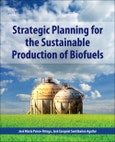Strategic Planning for the Sustainable Production of Biofuels presents several optimization models for the design and planning of sustainable biorefinery supply chains, including issues surrounding the potential of biomass feedstocks in multiple harvesting sites, availability and seasonality of biomass resources, different potential geographical locations for processing plants that produce multiple products using diverse production technologies, economies of scale for production technologies, demands and prices of multiple products, locations of storage facilities, and a number of transportation modes. Sustainability considerations are incorporated into the proposed models by including simultaneous economic, environmental and social performance in the evaluation of the supply chain designs.
Please Note: This is an On Demand product, delivery may take up to 11 working days after payment has been received.
Table of Contents
1. Introduction 2. Involving environmental aspect in the strategic planning of a biomass conversion system 3. Optimal planning and site selection for distributed multiproduct biorefineries involving economic, environmental and social objectives 4. Distributed biorefining networks for the valued-added processing of water hyacinth 5. Optimization of the supply chain associated to the production of bioethanol from residues of the agave from the tequila process in Mexico 6. Financial risk assessment and optimal planning of biofuels supply chains under uncertainty 7. Stochastic design of biorefinery supply chains considering economic and environmental objectives 8. Mixed-integer dynamic optimization or planning distributed biorefineries Appendix A. GAMS code for the model of Chapter 2 B. GAMS code for the model of Chapter 3 C. GAMS code for the model of Chapter 4 D. GAMS code for the model of Chapter 6 E. GAMS code for the model of Chapter 7 F. GAMS code for the model of Chapter 8








